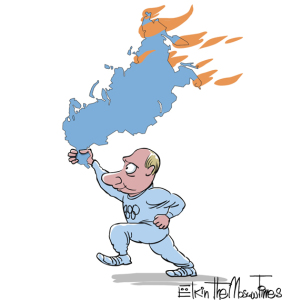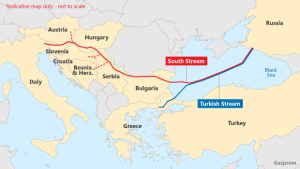 At the beginning of 2015 Gazprom CEO Alexey Miller, stated as if in an ultimatum that within a few years Russia will stop supplying gas to Europe through Ukraine. Instead of the pipeline Soyuz, which was pumping Siberian gas to the West for decades, a gas pipeline called Turkish Stream is to be built through the territory of Turkey up to its border with Greece. Do Europeans really need Russian gas delivered to that geographic point?
At the beginning of 2015 Gazprom CEO Alexey Miller, stated as if in an ultimatum that within a few years Russia will stop supplying gas to Europe through Ukraine. Instead of the pipeline Soyuz, which was pumping Siberian gas to the West for decades, a gas pipeline called Turkish Stream is to be built through the territory of Turkey up to its border with Greece. Do Europeans really need Russian gas delivered to that geographic point?
Russian prime minister Dmitry Medvedev said that the technical documentation for “Turkish Stream” is almost ready. “Gazprom” announced launch of the construction. However, both Western Europe and Turkey look at these announcements in amazement because it is not yet possible for the project to materialize in a form Moscow wants. The problem is that it is still unclear to whom Gazprom will sell gas pumped into the “TurkStream”. Turkey itself does not need such large quantities of gas and the pipeline is supposed to be almost exclusively for transit to the West. In addition to the “TurkStream” construction, Ankara also supports merging the existing “Trans-Adriatic” (TAP) and “Trans-Anatolian” (TANAP) gas pipelines. These will supply Southern Europe with Caspian gas and bypass Russia, which will undermine Gazprom’s monopoly in that gas market.
In the year past the war with Ukraine and the fall in the world energy prices reduced Russian state resources available for a pipeline construction. Russia then decided not to build an ambitious “South Stream”, a gas pipeline under the Black Sea, in favor of the cheaper Turkish route. Besides the economic reasons, the “South Stream” was rejected because EU ruled that the Gazprom monopoly does not comply with EU energy laws. This discrepancy between Gazprom’s plans and a gas market liberalization program has prevented member states of the EU, especially Bulgaria, to approve Gazprom’s proposal. Similar requirements will be applied to the “TurkStream”, and therefore both members of the European Union and non-EU countries of Southern Europe reacted warily to Moscow’s initiatives. Prime minister of the Republic of Macedonia, Nikola Gruevski, said his country would support the “TurkStream” only when the EU and Russia reach an agreement on this issue. Alexandar Vucic, prime minister of Serbia, started talking about the importance of the interests of “American friends” although his country is generally friendly to Russia, implying that Serbia supports the “Trans-Adriatic” gas pipeline.
However, even if Macedonia, Turkey, Serbia, Greece and Brussels agrees on the TurkStream’s extension, the key question remains unanswered: who will pay for it? European consumers of Russian gas are quite satisfied with the long-established transport of gas through Ukraine. They are not interested in a new infrastructure at their own expense from the borders of Turkey. Southern European countries believe that Russia will be the main investor in the project, but Moscow has made it clear that its financial capacity is limited. Recently Russian deputy finance minister, Sergei Storchak, said that the conditions of the International Monetary Fund’s lending programs to Greece most likely would not allow the country to turn to Russia for financial support for the construction of the gas pipeline extending the “TurkStream”.
 Gazprom believes that their European counterparts will invest in gas distribution infrastructure but Europe does not think so. The head of the German Wintershall, Mario Mehren, said that there is no energy consortium in Europe which would be willing to invest in the construction of a gas hub on the Turkish border. He noted that he was not optimistic about the construction of the pipeline through Macedonia and Greece, because it would be very difficult to find a company ready to take on such a project in such a short period of time.
Gazprom believes that their European counterparts will invest in gas distribution infrastructure but Europe does not think so. The head of the German Wintershall, Mario Mehren, said that there is no energy consortium in Europe which would be willing to invest in the construction of a gas hub on the Turkish border. He noted that he was not optimistic about the construction of the pipeline through Macedonia and Greece, because it would be very difficult to find a company ready to take on such a project in such a short period of time.
It seems that the political ambitions of the Kremlin once again come into conflict not only with the European laws but also with elementary economic logic. In the absence of buyers of Russian gas at the exit of the Turkish Stream, one may only suggest to Gazprom to build a giant Olympic torch on the Greek-Turkish border in honor of the anniversary of the victory of Russian athletes at the Sochi Olympics.





